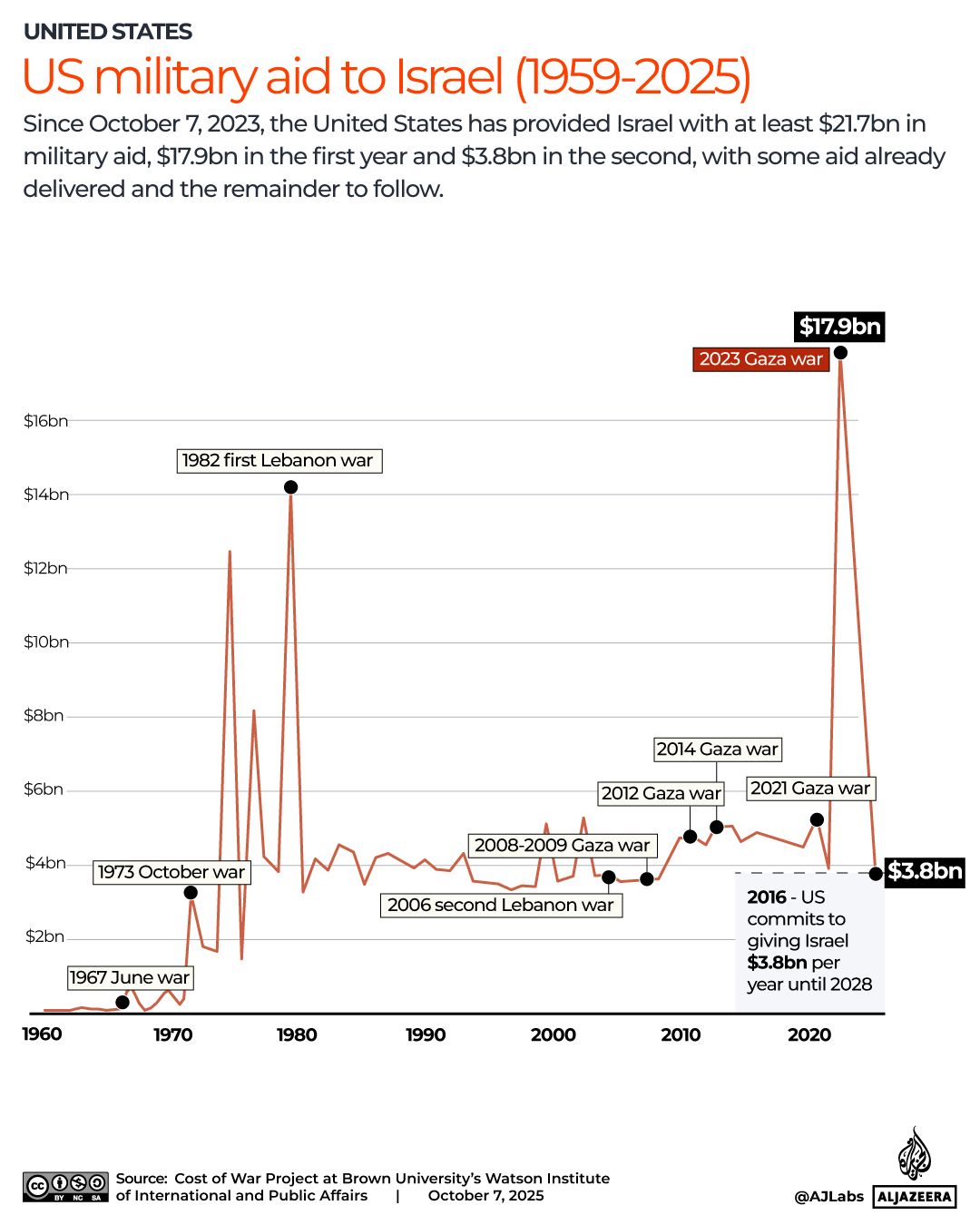Since October 2023, Israel’s ability to conduct extensive military operations throughout the Middle East has heavily depended on over $21 billion in financial aid from the United States, according to recent analyses.
Research published by the Costs of War Project at Brown University highlights that without American funding and weaponry, Israel would have struggled to sustain its aggressive campaign in Gaza, initiate conflict with Iran, or carry out repeated airstrikes in Yemen.
Experts affirm these findings, emphasizing that Israel’s ongoing conflicts in Gaza and the broader region are inseparable from the continuous diplomatic and monetary support provided by the US.
“The United States’ comprehensive backing is crucial for Israel’s military operations both within Gaza and across neighboring territories,” stated Omar H Rahman, a fellow at the Middle East Council on Global Affairs, in an interview with Al Jazeera.
Since the onset of hostilities in Gaza, the death toll has surpassed 67,000, with injuries exceeding 169,000. Many remain trapped beneath the rubble, while Israeli strikes have also resulted in numerous casualties in Yemen and over a thousand deaths during confrontations with Iran in June.
US Financial Support: The Backbone of Israel’s Military Campaigns
Two years prior, a Hamas-led assault resulted in the deaths of 1,139 Israelis and the capture of more than 200 individuals. Israel’s retaliatory measures extended beyond Gaza, targeting groups it deemed hostile throughout the region.
These actions included intensified raids in the West Bank and Jerusalem, the killing of over 4,000 people in Lebanon alongside widespread destruction of villages, incursions into Lebanese and Syrian territories, bombing Iran’s consulate in Damascus, engaging in a 12-day conflict with Iran, and exchanging attacks with Yemen’s Houthi forces.
Researchers assert that such extensive military endeavors would have been impossible without the steady influx of US resources.
“Considering the magnitude of current and projected expenditures, it is evident that the Israeli Defense Forces could not have inflicted such devastation in Gaza or escalated operations regionally without American financial aid, weaponry, and political backing,” explained William D Hartung, senior research fellow at the Quincy Institute for Responsible Statecraft, in his report titled US Military Aid and Arms Transfers to Israel, October 2023-September 2025.
The Quincy Institute, which advocates for shifting US foreign policy away from perpetual warfare toward diplomacy and restraint, co-released this report alongside the Costs of War Project.
Complementing Hartung’s analysis, Linda J Bilmes, a public finance expert at Harvard Kennedy School, estimated that US military aid and regional operations have cost between $31.35 billion and $33.77 billion since October 7, 2023.
These figures underscore how American support has enabled Israel to sustain multi-front conflicts over the past two years, a conclusion echoed by numerous analysts.
“Israel’s military campaigns rely heavily on US-supplied arms,” Rahman noted. “While Israel manufactures some military technology, it does not produce the bombs themselves. Without American assistance, such extensive bombardments would be unfeasible.”
Enduring Bipartisan Backing from the United States
The United States has historically been Israel’s most steadfast ally, providing the largest share of foreign aid annually-approximately $3.3 billion-and cumulatively exceeding $150 billion up to 2022.
This unwavering support has persisted across multiple US administrations, regardless of political shifts.
Hartung’s report highlights that both the Biden and Trump administrations committed to arms sales agreements worth tens of billions, including future payments for weapons and services.

Rahman remarked, “This bipartisan consensus has enabled Israel, a frequent violator of international law, to operate with impunity, shielded by Western political and social mainstreams.”
However, public opinion in the US is shifting. As more scholars label Israel’s actions in Gaza as genocide, American attitudes toward Israel have deteriorated significantly.
Among American Jews, this sentiment is also changing. A recent Washington Post survey found that 40% believe Israel is committing genocide, while over 60% consider its actions in Gaza to be war crimes.
US Budget Priorities and Political Consequences
These evolving perceptions could have profound effects on future US political landscapes.
“Some former Biden officials might wish to avoid confronting this reality, but it’s unrealistic,” said Matt Duss, executive vice president at the Center for International Policy in Washington, DC. “Acknowledging the Biden administration’s role in facilitating genocide will be unavoidable for any Democrat seeking the 2028 nomination.”
Beyond public criticism, the substantial financial commitment to Israel’s military efforts has sparked frustration among Americans concerned about domestic priorities.
“Budget allocations reflect national priorities, yet despite America’s minimal social safety net compared to other developed nations, billions are consistently allocated to support Israel’s wars,” Duss observed.
“Anyone managing a household budget would recognize the absurdity of this, but it also reveals deeper systemic issues within American politics. This isn’t solely about Israeli interests; the US military-industrial complex profits enormously, as much of this aid funnels into American companies through arms sales and related contracts.”






















